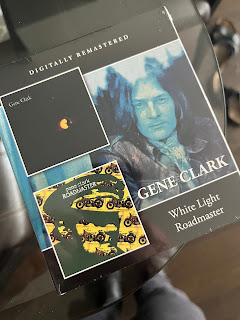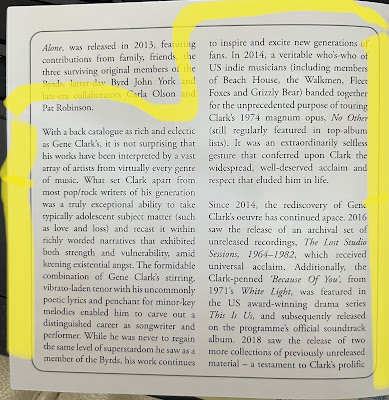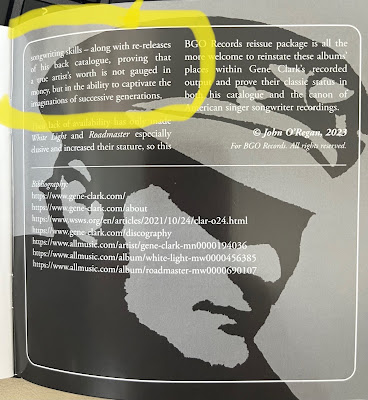Plagiarism of my work in the notes of BGO’s White Light / Roadmaster reissue
At first, I was excited to hear about UK-based BGO’s new 2-on-1 CD reissue of Gene’s White Light and Roadmaster. While I’m sure a lot of longtime fans would’ve preferred another archival release along the lines of The Lost Studio Sessions 1964-1982 or Gene Clark Sings for You, it’s also important to maintain the availability of Gene’s core catalogue. And even though I own these titles several times over, I still bought a copy, if only to support the larger efforts of #teamGene.
I was also interested to see who had been tapped to write the liner notes.
Turns out the new notes are credited to a fellow named John O’Regan. The essay offers a rather stilted, pedestrian recounting of Gene’s life and career. It reads like a series of unrelated bullet points, lacking in both nuance and insight (it later occurred to me that O’Regan might have enlisted help from ChatGPT). Eventually, it begins to resemble a Wikipedia entry written by someone with absolutely no interest in their subject. Familiar facts are dutifully trotted out in a stiff, choppy manner; each sentence assumes the same, tedious cadence, often beginning with Gene’s name (“Clark did this. Clark did that…”).
But towards the end, I started to feel a strange sense of déjà vu. For a few moments I sat there completely flummoxed; I couldn’t quite figure it out. But then when I saw the bibliography, it became clear.
I was reading my own writing.
Listed in O’Regan’s bare-bones bibliography is this bio, which I contributed to Gene-Clark.com. O’Regan not only used my piece to inform himself, he actually lifted entire paragraphs of my writing and inserted them into his essay (see below). To anyone reading the piece, the writing would appear to be his – which I believe was the intent. And while he deigned to include the Gene-Clark.com web address in his bibliography, my name is not mentioned at all.
In case you’re wondering, BGO shrugged and referred me to O’Regan. O’Regan wrote a condescending, self-pitying letter of apology that stopped well short of admitting he knowingly stole my work.
But he and I both know the truth – don’t we, John?
Citing the sources of one’s information and directly quoting them are two different things. O’Regan made no attempt to use quotation marks for my words, yet he had no problem playing by the rules for other works quoted in his essay. So O’Regan obviously knows it’s a writer’s responsibility to indicate direct quotations of someone else’s work – he simply chose to ignore them when it came to mine.
It’s the sheer volume of the thievery that blows me away. Paragraphs of my work! Over 350 words! And this clown was surely paid for his efforts. I am thoroughly disgusted by that.
Apart from knowing how to string together a sentence, tell a good story, and meet your deadlines, there aren’t that many rules to being a writer. You don’t punch a clock, you don’t have a boss looking over your shoulder, and heck, if you want, you can write while drunk, stoned, hungover or even sitting around drinking coffee in your underwear. The only real, sacred rule of being a writer is YOU DON’T STEAL SOMEONE ELSE’S SHIT - EVER.
Oh, one more thing…perhaps unsurprisingly, someone on Twitter recently suggested that other parts of O’Regan’s notes were lifted from the late Johnny Rogan’s work.
Fuck you, John O’Regan.





Comments
His essays for the RGO twofers are often ungodly long biographies, but like you say resemble barely coherent collections of bullet points. They also rarely have specifcally something to do with the albums they are attached to. And there are definitely no insights to be had from Mr. O'Regan.